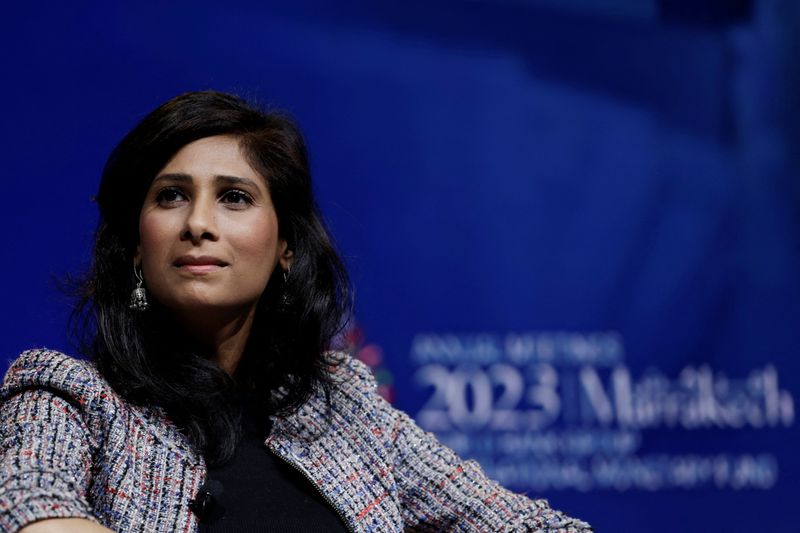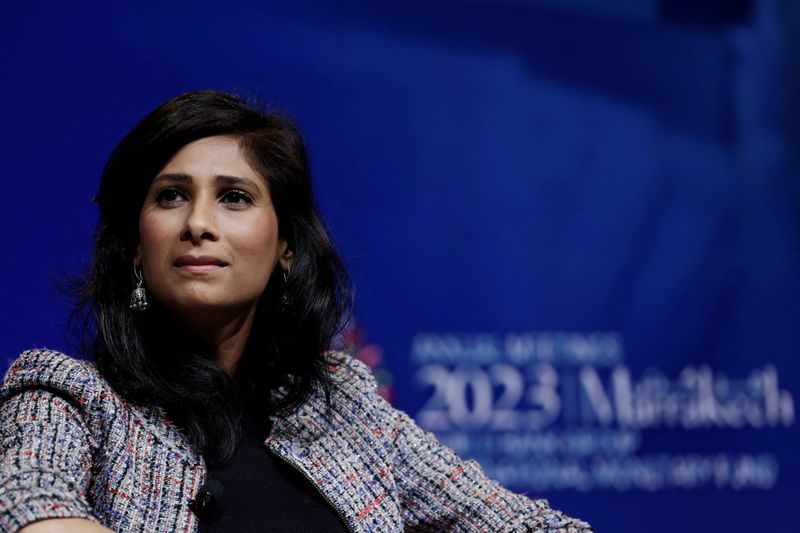Economy
IMF’s Gopinath says economic fragmentation could cut global GDP by 7%


© Reuters. FILE PHOTO: First Deputy Managing Director of the International Monetary Fund, Gita Gopinath, attends a panel on the fourth day of the annual meeting of the IMF and the World Bank, following last month’s deadly earthquake, in Marrakech, Morocco, October 1
WASHINGTON (Reuters) – The International Monetary Fund’s No. 2 official on Monday warned that fragmentation in the global economy and clear shifts in underlying bilateral trade could trigger a “new Cold War” given the conflict in Ukraine and U.S.-China tensions.
IMF First Deputy Managing Director Gita Gopinath told the International Economic Association in Medellin, Colombia, that losses could reach 2.5% to 7% of global gross domestic product if the world economy fragmented into two blocs, seen as predominantly the U.S. and Europe in the West and China and Russia in the East.
“While there are no signs of broad-based retreat from globalization, fault lines are emerging as geoeconomic fragmentation is increasingly a reality,” she said. “If fragmentation deepens, we could find ourselves in a new Cold War.”
The impact of the COVID-19 pandemic, which gummed up the transport of goods, particularly from China, as well as the effect of Russia’s invasion of Ukraine, which caused a spike in energy and commodities prices, have caused governments to shift their focus to protecting themselves by producing more domestically or “friend-shoring” to other countries with which they share more stable relationships.
After years of increasing trade tensions and rising tariffs, China is no longer the largest U.S. trading partner, with Mexico having assumed that role. China’s share of US imports fell to 13 percent in the first half of 2023 from 22 percent in 2018.
Around 3,000 trade-restrictive measures were imposed last year around the world – nearly three times the number imposed in 2019.
Such fragmentation has potential serious consequences that could outweigh greater domestic economic resiliency and security, Gopinath said.
“If not properly managed, the costs could easily overwhelm these benefits, and potentially reverse nearly three decades of peace, integration, and growth that helped lift billions out of poverty,” she added.
Gopinath noted that global fragmentation would make it difficult to meet common challenges like climate change and she called on countries to implement “pragmatic” approaches that preserve the benefits of free trade as much as possible.
A “green corridor” agreement could guarantee the international flow of minerals critical for the clean energy transition, she said, while similar agreements for essential food commodities and medical supplies could ensure minimum cross-border flows in an increasingly uncertain world.
“Such agreements would safeguard the global goals of averting climate change devastation, food insecurity and pandemic-related humanitarian disaster,” Gopinath said.
She said any restriction of imports on national security grounds should be narrow and that countries should assess whether there is truly a lack of suppliers from less risky regions, particularly for widely used technologies such as semi-conductors, before deciding to bring production home.
Economy
Russian central bank says it needs months to make sure CPI falling before rate cuts -RBC


© Reuters. Russian Central Bank Governor Elvira Nabiullina attends a news conference in Moscow, Russia June 14, 2019. REUTERS/Shamil Zhumatov/File Photo
MOSCOW (Reuters) – Russia’s central bank will need two to three months to make sure that inflation is steadily declining before taking any decision on interest rate cuts, the bank’s governor Elvira Nabiullina told RBC media on Sunday.
The central bank raised its key interest rate by 100 basis points to 16% earlier in December, hiking for the fifth consecutive meeting in response to stubborn inflation, and suggested that its tightening cycle was nearly over.
Nabiullina said it was not yet clear when exactly the regulator would start cutting rates, however.
“We really need to make sure that inflation is steadily decreasing, that these are not one-off factors that can affect the rate of price growth in a particular month,” she said.
Nabiullina said the bank was taking into account a wide range of indicators but primarily those that “characterize the stability of inflation”.
“This will take two or three months or more – it depends on how much the wide range of indicators that characterize sustainable inflation declines,” she said.
The bank will next convene to set its benchmark rate on Feb. 16.
The governor also said the bank should have started monetary policy tightening earlier than in July, when it embarked on the rate-hiking cycle.
Economy
China identifies second set of projects in $140 billion spending plan


© Reuters. FILE PHOTO: Workers walk past an under-construction area with completed office towers in the background, in Shenzhen’s Qianhai new district, Guangdong province, China August 25, 2023. REUTERS/David Kirton/File Photo
SHANGHAI (Reuters) – China’s top planning body said on Saturday it had identified a second batch of public investment projects, including flood control and disaster relief programmes, under a bond issuance and investment plan announced in October to boost the economy.
With the latest tranche, China has now earmarked more than 800 billion yuan of its 1 trillion yuan ($140 billion) in additional government bond issuance in the fourth quarter, as it focuses on fiscal steps to shore up the flagging economy.
The National Development and Reform Commission (NDRC) said in a statement on Saturday it had identified 9,600 projects with planned investment of more than 560 billion yuan.
China’s economy, the world’s second largest, is struggling to regain its footing post-COVID-19 as policymakers grapple with tepid consumer demand, weak exports, falling foreign investment and a deepening real estate crisis.
The 1 trillion yuan in additional bond issuance will widen China’s 2023 budget deficit ratio to around 3.8 percent from 3 percent, the state-run Xinhua news agency has said.
“Construction of the projects will improve China’s flood control system, emergency response mechanism and disaster relief capabilities, and better protect people’s lives and property, so it is very significant,” the NDRC said.
The agency said it will coordinate with other government bodies to make sure that funds are allocated speedily for investment and that high standards of quality are maintained in project construction.
($1 = 7.1315 renminbi)
Economy
Russian central bank says it needs months to make sure CPI falling before rate cuts -RBC


© Reuters. Russian Central Bank Governor Elvira Nabiullina attends a news conference in Moscow, Russia June 14, 2019. REUTERS/Shamil Zhumatov/File Photo
MOSCOW (Reuters) – Russia’s central bank will need two to three months to make sure that inflation is steadily declining before taking any decision on interest rate cuts, the bank’s governor Elvira Nabiullina told RBC media on Sunday.
The central bank raised its key interest rate by 100 basis points to 16% earlier in December, hiking for the fifth consecutive meeting in response to stubborn inflation, and suggested that its tightening cycle was nearly over.
Nabiullina said it was not yet clear when exactly the regulator would start cutting rates, however.
“We really need to make sure that inflation is steadily decreasing, that these are not one-off factors that can affect the rate of price growth in a particular month,” she said.
Nabiullina said the bank was taking into account a wide range of indicators but primarily those that “characterize the stability of inflation”.
“This will take two or three months or more – it depends on how much the wide range of indicators that characterize sustainable inflation declines,” she said.
The bank will next convene to set its benchmark rate on Feb. 16.
The governor also said the bank should have started monetary policy tightening earlier than in July, when it embarked on the rate-hiking cycle.

 Forex3 years ago
Forex3 years agoForex Today: the dollar is gaining strength amid gloomy sentiment at the start of the Fed’s week

 Forex3 years ago
Forex3 years agoUnbiased review of Pocket Option broker

 Forex3 years ago
Forex3 years agoDollar to pound sterling exchange rate today: Pound plummeted to its lowest since 1985

 Forex3 years ago
Forex3 years agoHow is the Australian dollar doing today?

 Cryptocurrency3 years ago
Cryptocurrency3 years agoWhat happened in the crypto market – current events today

 World3 years ago
World3 years agoWhy are modern video games an art form?

 Commodities3 years ago
Commodities3 years agoCopper continues to fall in price on expectations of lower demand in China

 Economy3 years ago
Economy3 years agoCrude oil tankers double in price due to EU anti-Russian sanctions





















